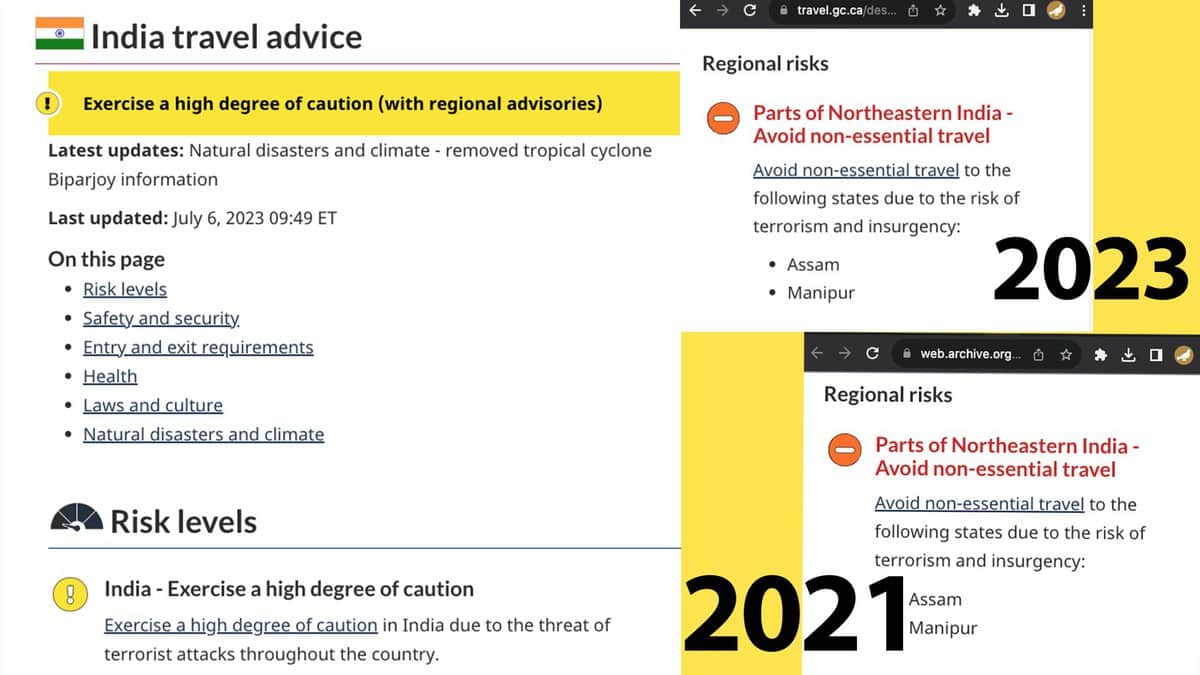
Several reports appeared in the media on Tuesday, September 19, suggesting that Canada had issued a new travel advisory, urging its citizens to exercise a “high degree of caution” when travelling to India. This came in the wake of escalating tensions in diplomatic relations between the two countries.
News agency ANI posted on X (formerly Twitter) screenshots from the Canadian government’s travel advisory to India which stated that Canadian citizens should “exercise a high degree of caution” for parts of India including Union Territory of Jammu And Kashmir, parts of the northeast and border areas to Pakistan.
However, it was found that the advisory was issued long before diplomatic tensions between the two nations.
“Avoid all travel to the Union Territory of Jammu and Kashmir due to the unpredictable security situation. There is a threat of terrorism, militancy, civil unrest and kidnapping. This advisory excludes travelling to or within the Union Territory of Ladakh,” says Canada in its updated travel advisory for India,” ANI wrote.
The screen shot of the Canadian travel advisory portal, which was updated on September 18, was first shared by a right-wing X (formerly Twitter) user, which was later picked up by ANI. Subsequently the report appeared in several national news organisations.
Canada’s authorities later clarified that the update on travel advisory for India was particularly in the health section. It included warnings about Zika, measles, and COVID-19.
However, the headline, which stated “exercise extreme caution while traveling to India,” misled several news outlets including Siasat.com. This was an inadvertent error made by the journalist responsible for covering this development.
The tensions arose after Canadian Prime Minister Justin Trudeau accused the Indian government of involvement in the killing of pro-Khalistan activist Hardeep Singh Nijjar in Canada. Nijjar was killed outside a Sikh cultural centre in Surrey, British Columbia on June 18. India has vehemently denied any involvement in the incident.
In response to these allegations, the High Commissioner of Canada to India received a summons from the Government of India, conveying the decision to expel a senior Canadian diplomat stationed in India. As a result of these developments, the Canadian High Commission in Delhi asked its local staff to leave the premises, and the commission was shut down on Wednesday afternoon.
India has strongly rejected the allegations made by Canada, calling them “absurd and motivated.” The ministry of external affairs said, “Such allegations seek to shift the focus from Khalistani terrorists and extremists who have found shelter in Canada and continue to pose a threat to India’s sovereignty and territorial integrity.”
The Indian government has expressed concern over the Canadian government’s sympathies towards these elements and its failure to take action against them. India has urged Canada to take prompt and effective legal action against all anti-India elements operating from its soil.
This diplomatic dispute has led to reciprocal expulsions of diplomats from both countries, further straining their relations. India has expressed growing concern about the interference of Canadian diplomats in its internal matters and their involvement in activities it deems as anti-India.



